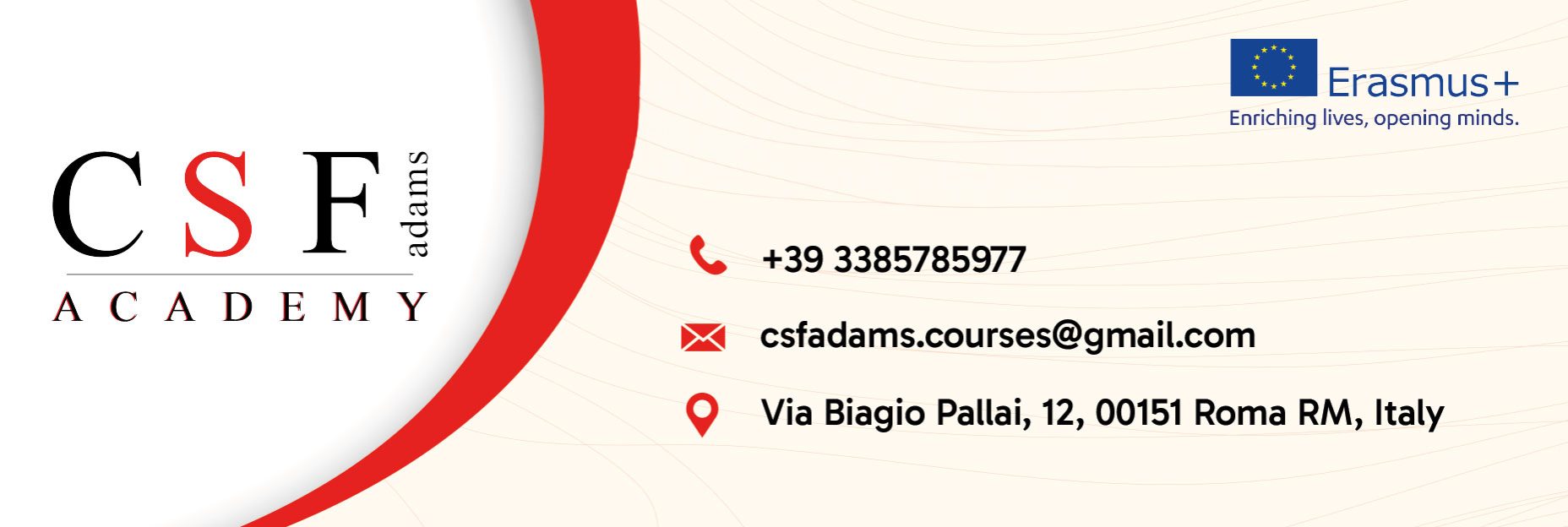CSF Adams Academy
CSF Adams Academy
“Empowering Teachers, Connecting Cultures”
OID: E10048333
csfadams.courses@gmail.com
TEACHER TRAINING COURSES
- Digital Innovation in Education: ICT, AI & Gamification
- Future-Proofing Classrooms: Advanced Digital Pedagogy
- Digital Storytelling and Visual Narratives in Education
- Inclusive Storytelling: Diversity, Empathy & Emotional Intelligence
- Environmental Education: Nature, Sustainability & Climate Action
- Resilient Teaching & Educator Well-being in Modern Classrooms
- Mindfulness, Leadership & Anti-Bullying Strategies in Schools
- Inclusive & Creative Classrooms through Art and Expression
- STEAM in Education: Creativity, Innovation & Interdisciplinary Learning
- Stress Management and Emotional Well-being for Educators
- Cultural Heritage & Museum-Based Learning
- From Museums to Classrooms: Creative Cultural Learning
- Creative Photography and Visual Expression in Education
- Entrepreneurial Mindset in Education: Fostering Creativity, Initiative & Innovation
- Innovative Language Teaching: CLIL and TPRS Approaches for Foreign Language Classrooms
ABOUT US
C.S.F. Adams Academy is the official training branch of Centro Sperimentale di Fotografia Adams, specializing in the design and delivery of European and Erasmus+ training programs in photography, digital innovation, and inclusive education.
The Academy offers tailor-made learning experiences for educators, youth workers, adult learners, and creativeprofessionals, combining artistic methods with modern educational tools.
Founded in 1996 in Rome, the Centro Sperimentale di Fotografia Adamsis a well-established cultural association and a recognized center for photographic culture and education.
With over 6,000 active members, the Association has built a strong reputation for its high-quality training courses, exhibitions, and international collaborationsin the field of visual arts.
Throughout the year, it offers a diverse range of opportunities, including basic to advanced photography courses, thematic workshops, and professional seminars.
The Association also takes part in major festivals and artistic events, contributing to both creative and educational programming.
The organization collaborates withpublic institutions, museums, local authorities, and cultural organizations, while offering access to state-of-the-art facilities, including:
- Fully equipped training rooms
- Professional photo studios
- Advanced lighting systems
- PC and Macdigital workstations
- High-resolution scanners and printers
Our Role in European Projects
As part of its European engagement, C.S.F. Adams Academy brings strong expertise in:
- School, adult, and vocational education and training
- Innovative methodologiesand digital tools in education
- Photography and visual storytelling
- Cultural heritageand museum-based learning
- Graphic designand visual communication
- Inclusive, art-based educational practices
- Use of Augmented Reality (AR), Virtual Reality (VR), and AIin learning environments
- Stress management, resilience building, and leadership training
- Outdoor educationand experiential learning
- Soft skills, entrepreneurship, and creativity development
- Custom-designed training for partner needs
Additional services include:
- Coordination of international cultural events
- Exhibition curation and production
- Audiovisual and multimedia content creation
- Website and digital platform development
- Branding and identity design
- Educational visitsto museums, heritage sites, and exhibitions
OUR COURSES
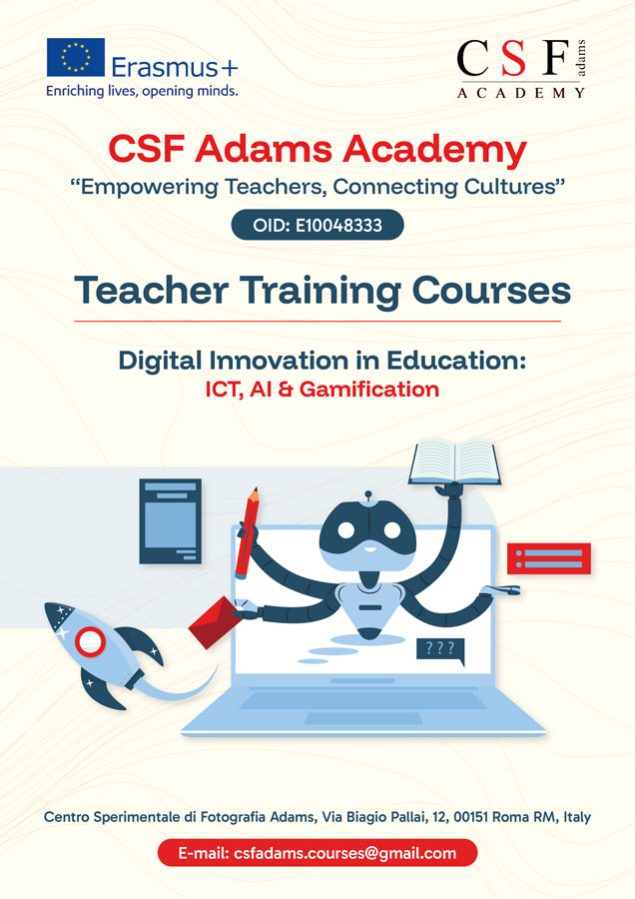
Digital Innovation in Education: ICT, AI & Gamification
In this course, we explore how digital tools are transforming teaching and learning. Participants will discover how Information and Communication Technologies (ICT), Artificial Intelligence (AI), and Gamification can enhance student engagement, personalize learning, and promote 21st-century skills.
This innovative training course is tailored for educators, trainers, and youth and VET staff who want to transform their teaching through digital technologies. It covers the smart use of ICT tools, the power of Artificial Intelligence (AI) in education, and the motivational impact of Gamification. Participants will also explore the creative potential of Augmented Reality (AR) and experiment with a variety of engaging educational apps and platforms. The course offers a hands-on, practical approach, blending digital theory with interactive workshops, tool demonstrations, and real-life classroom applications. By the end of the course, participants will gain practical digital skills, fresh perspectives, and ready-to-use resources to design inclusive, future-oriented learning experiences.
By the end of this course, participants will be able to:
- Understand the role and impact of ICT, AI, AR, and Gamification in modern education.
- Identify and apply a range of digital tools and educational apps suitable for diverse learners.
- Design and deliver interactive lessons using Augmented Reality to enhance student engagement.
- Integrate AI-powered tools (e.g., chatbots, smart assistants) to personalize and support learning.
- Use gamified strategies to increase motivation, participation, and retention in the classroom.
- Promote digital inclusion, critical thinking, and creativity through technology-enhanced activities.
- Develop a digital teaching toolkit to implement in formal and non-formal educational settings.
- Collaborate with peers to share ideas, co-create content, and reflect on best practices in digital education.
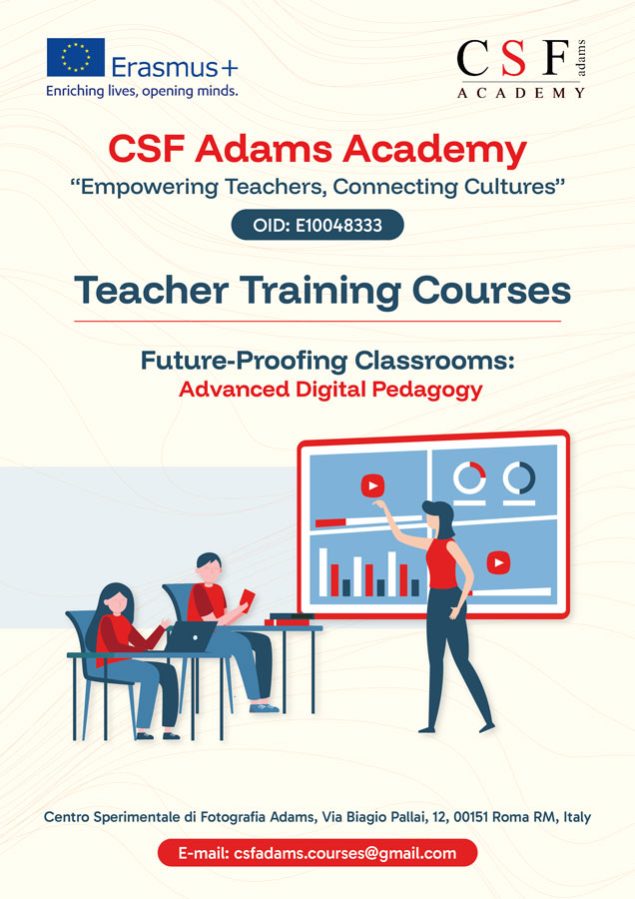
Future-Proofing Classrooms: Advanced Digital Pedagogy
This course is designed specifically for educators eager to innovate and adapt to the evolving digital landscape. This course will equip you with cutting-edge pedagogical strategies and digital tools to create engaging, resilient, and inclusive learning environments. Join us to explore practical approaches, from AI integration and immersive technologies to personalized learning pathways. Future-Proofing Classrooms: Advanced Digital Pedagogy is designed to empower educators to navigate and leverage cutting-edge digital tools and innovative teaching strategies. Designed for forward-thinking teachers, this course covers essential digital trends such as AI-driven education, immersive technologies, and personalized learning. Through hands-on workshops and practical insights, participants will develop skills to foster dynamic, inclusive, and future-ready classrooms. Transform your teaching practice, inspire students, and confidently embrace the digital future of education.
By the end of this course, participants will:
- Integrate Advanced Digital Tools.
- Effectively apply AI, immersive tech, and digital platforms in classroom practice.
- Develop Future-Ready Teaching Strategies
- Design innovative, personalized learning experiences adaptable to future educational needs.
- Promote Digital Literacy
- Equip students with critical digital competencies for lifelong learning.
- Enhance Classroom Engagement
- Utilize technology to create inclusive, interactive, and engaging educational environments.
- Evaluate Digital Impact
- Assess and reflect on the effectiveness of digital pedagogical approaches in improving student outcomes.
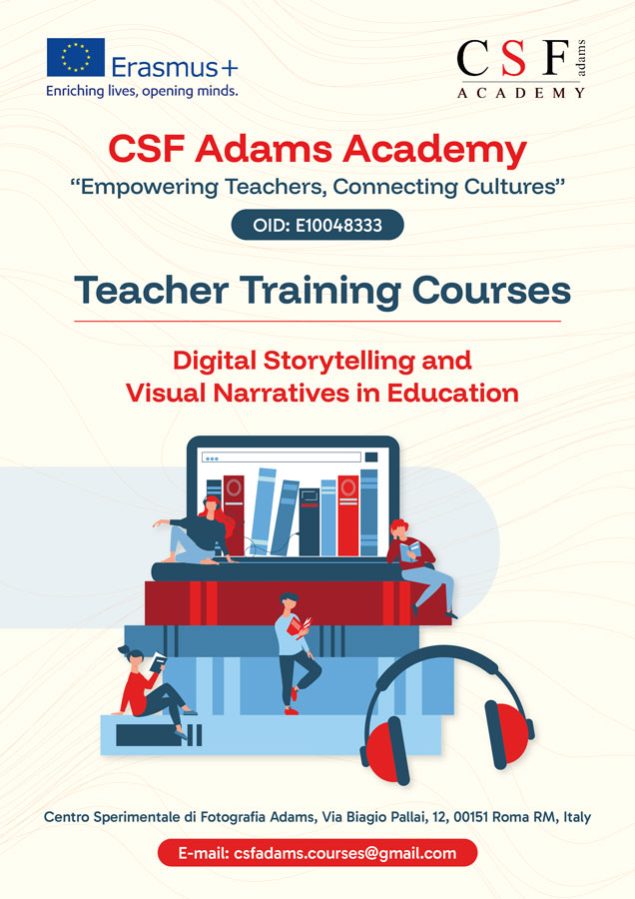
Digital Storytelling and Visual Narratives in Education
Digital Storytelling and Visual Narratives in Education is a dynamic course designed to help educators harness the power of storytelling and visual media to create deeper, more meaningful learning experiences. Combining creativity with technology, the course explores how narrative techniques and digital tools can be used to enhance engagement, critical thinking, and emotional connection in the classroom.
This course equips teachers with the skills to design and deliver powerful digital stories using various multimedia elements such as images, videos, sound, and animation. Participants will explore narrative structures, visual literacy, and storytelling techniques, while learning to apply digital tools to create compelling educational content. Through hands-on practice and collaborative activities, educators will learn how to make learning more personal, inclusive, and impactful for their students.
By the end of the course, participants will be able to understand and apply the principles of digital storytelling and visual communication in educational settings. They will be able to design engaging visual narratives using digital tools, enhance student expression and creativity through storytelling, and integrate storytelling techniques across subjects and age groups. The course also aims to strengthen teachers’ capacity to foster emotional literacy, intercultural understanding, and student voice using digital narratives.
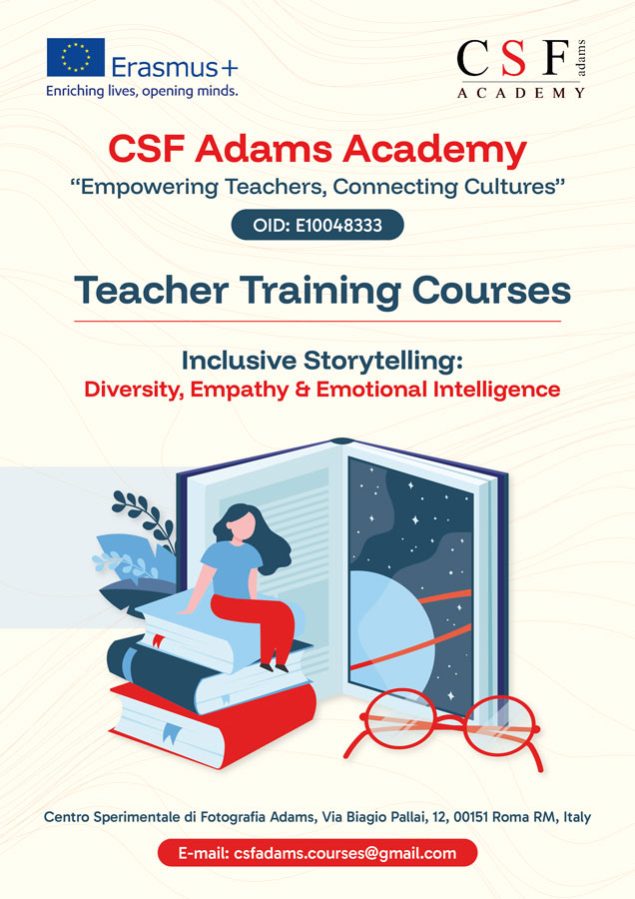
Inclusive Storytelling: Diversity, Empathy & Emotional Intelligence
In today’s interconnected and diverse classrooms, the role of educators extends far beyond delivering content. Inclusive teaching requires a deep understanding of students’ varied backgrounds, emotions, and needs. This training course, Inclusive Teaching: Diversity, Empathy & Emotional Intelligence, empowers educators to create learning environments where every student feels seen, heard, and value.
- Inclusive Storytelling: Diversity, Empathy & Emotional Intelligence is a professional development course designed to support educators in building inclusive, compassionate, and emotionally responsive learning environments. The course explores how diversity—across culture, language, ability, gender, and socioeconomic background—shapes the educational experience and offers practical strategies for fostering a sense of belonging for all students. Participants will engage with the core principles of empathy and emotional intelligence to enhance their communication, classroom management, and conflict resolution skills. Emphasis is placed storytelling,reflective teaching practices, inclusive language, and trauma-informed approaches that prioritize student well-being. By the end of the course, educators will be equipped with the tools to recognize individual differences, respond with sensitivity, and create emotionally safe, equitable spaces that promote academic and personal growth.
- To understand the role of storytelling as a powerful tool for fostering inclusion and cultural awareness in educational settings.
- To explore how diverse narratives can challenge stereotypes, promote empathy, and celebrate multiple identities and perspectives.
- To develop skills in emotionally intelligent communication and active listening through storytelling practices.
- To create and facilitate storytelling activities that are inclusive of students’ backgrounds, abilities, languages, and emotional needs.
- To reflect on personal biases and learn how to use storytelling to build bridges between individuals and communities.
- To integrate inclusive storytelling methods into classroom routines and curriculum design with a focus on social-emotional learning.
- To empower students to share their own stories in a safe, respectful, and affirming environment.
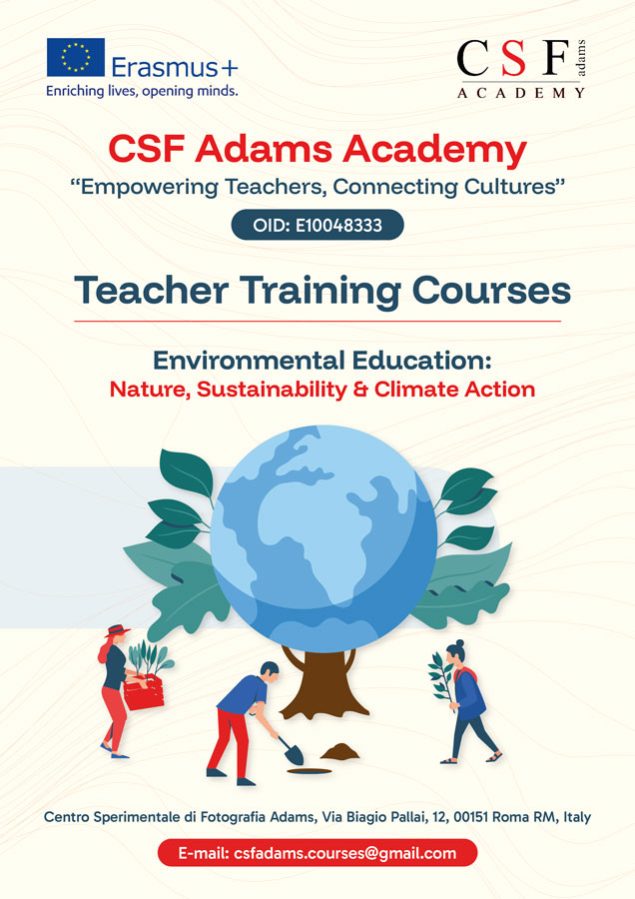
Environmental Education: Nature, Sustainability & Climate Action
Environmental Education: Nature, Sustainability & Climate Action is a practical and inspiring training course designed for teachers who want to bring environmental topics to life in their classrooms. The course explores key themes such as biodiversity, climate change, circular economy, and sustainable living, while emphasizing hands-on, nature-based learning. Participants will discover innovative teaching strategies that connect students with real-world environmental challenges and empower them to become active global citizens. The course promotes outdoor education, critical thinking, and eco-friendly practices that align with the Sustainable Development Goals (SDGs). Through collaboration, reflection, and action-oriented projects, teachers will gain the skills and confidence to foster environmental responsibility, curiosity, and climate awareness in their students.
- Environmental Education: Nature, Sustainability & Climate Action is a practical and inspiring training course designed for teachers who want to bring environmental topics to life in their classrooms. The course explores key themes such as biodiversity, climate change, circular economy, and sustainable living, while emphasizing hands-on, nature-based learning. Participants will discover innovative teaching strategies that connect students with real-world environmental challenges and empower them to become active global citizens. The course promotes outdoor education, critical thinking, and eco-friendly practices that align with the Sustainable Development Goals (SDGs). Through collaboration, reflection, and action-oriented projects, teachers will gain the skills and confidence to foster environmental responsibility, curiosity, and climate awareness in their students.
- To understand the principles of environmental education and its role in promoting sustainability and climate action.
- To explore key environmental topics such as biodiversity, climate change, and sustainable living in an educational context.
- To develop strategies for integrating nature-based and outdoor learning into the school curriculum.
- To foster students’ critical thinking, problem-solving, and active citizenship through environmental projects and activities.
- To apply interdisciplinary teaching methods that connect science, geography, social studies, and the arts with environmental themes.
- To strengthen teachers’ ability to inspire eco-friendly behaviors and climate responsibility among young learners.
- To design inclusive, action-oriented lesson plans and projects that support the Sustainable Development Goals (SDGs).
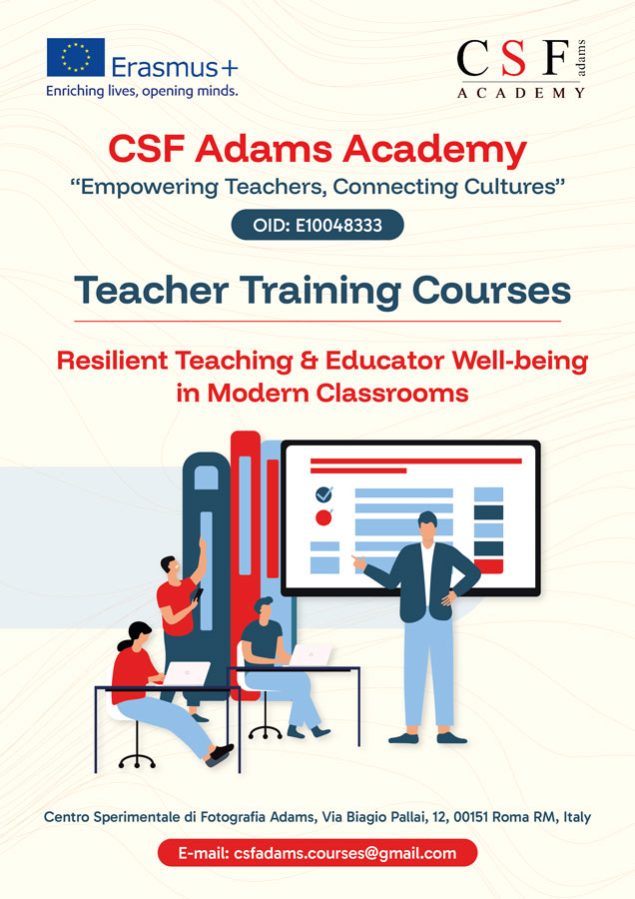
Resilient Teaching & Educator Well-being in Modern Classrooms
- Teaching today requires more than delivering knowledge — it demands emotional strength, adaptability, and self-care. Resilient Teaching & Educator Well-being in Modern Classrooms is designed to help teachers build resilience, manage stress, and maintain a healthy balance in their professional and personal lives. This course empowers educators with practical strategies to navigate change, foster positive mindsets, and create supportive learning environments. Through reflection, connection, and actionable techniques, participants will strengthen their well-being and sustain their passion for teaching in a fast-evolving educational world.
- To understand the concept of resilience and its importance for educators in modern classrooms.
- To recognize signs of stress and burnout and apply strategies for prevention and recovery.
- To develop practical skills in emotional regulation, mindfulness, and stress management.
- To build habits that support personal well-being, work-life balance, and sustainable teaching practices.
- To create positive, supportive, and emotionally safe classroom environments.
- To strengthen adaptability and growth mindset in response to educational challenges.
- To design a personal resilience and well-being action plan for long-term professional fulfillment.
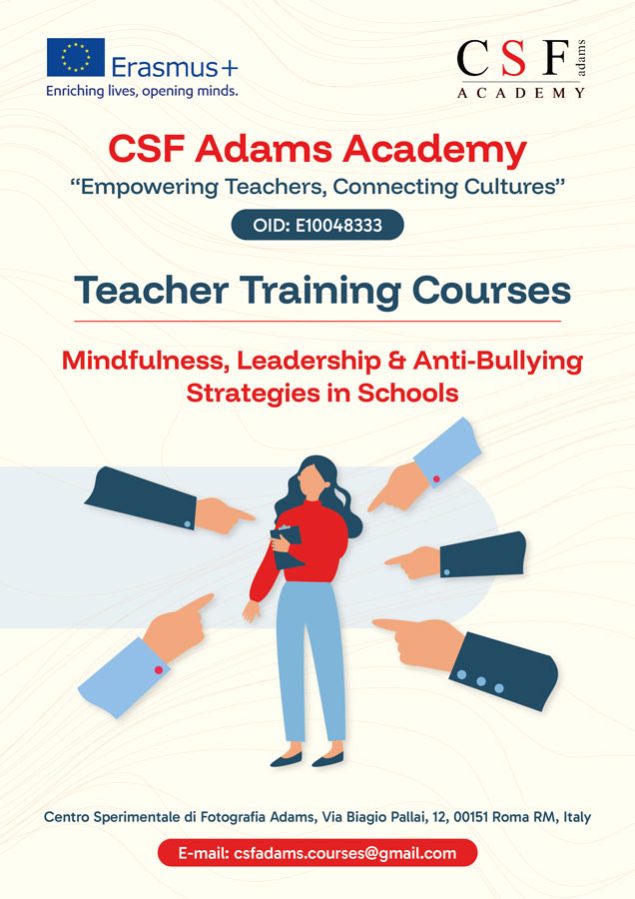
Mindfulness, Leadership & Anti-Bullying Strategies in Schools
Creating safe, inclusive, and empowering school environments requires strong leadership, emotional awareness, and proactive intervention. Mindfulness, Leadership & Anti-Bullying Strategies in Schools is a course designed to equip teachers and school leaders with the tools to foster positive school cultures. Through mindfulness practices, participants will strengthen emotional intelligence and presence, enhancing their leadership abilities. The course also offers concrete strategies to prevent, recognize, and address bullying, focusing on building empathy, resilience, and respectful communication. Participants will learn how to lead by example, promote well-being, and create safer spaces where every student can thrive.
- Mindfulness, Leadership & Anti-Bullying Strategies in Schools is a practical and empowering training course designed for teachers and school leaders who aim to create safer, more supportive learning environments. The course explores how mindfulness can enhance self-awareness, emotional regulation, and compassionate leadership in educational settings. Participants will develop skills to foster positive relationships, model respectful behavior, and address bullying through preventive and restorative approaches. Emphasis is placed on proactive strategies, whole-school involvement, and the development of action plans that build a culture of empathy, respect, and resilience. By the end of the course, participants will be equipped with mindful leadership techniques and anti-bullying frameworks that they can apply directly in their schools.
- To understand the role of mindfulness in promoting emotional regulation, empathy, and leadership in schools.
- To develop practical leadership skills that foster positive, inclusive, and respectful school environments.
- To recognize different forms of bullying and understand their impacts on students’ well-being and learning.
- To design and implement proactive, school-wide anti-bullying strategies based on prevention and early intervention.
- To apply mindfulness techniques to manage conflicts, reduce stress, and promote healthy communication.
- To empower students through leadership models that encourage kindness, resilience, and mutual respect.
- To create an action plan for building a mindful, bully-free culture within their school community.
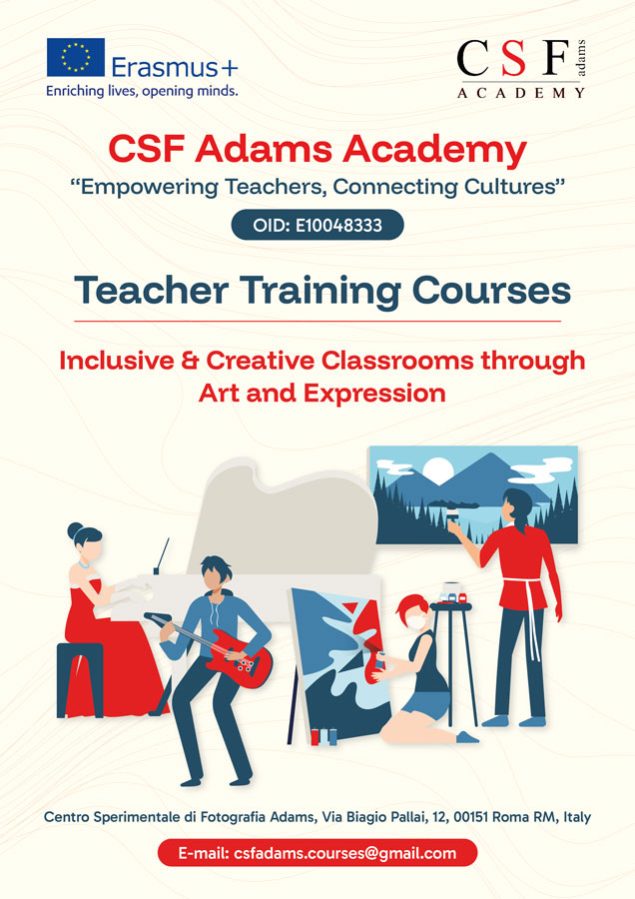
Inclusive & Creative Classrooms through Art and Expression
Art is a universal language that nurtures inclusion, creativity, and emotional growth. Inclusive & Creative Classrooms through Art and Expression is a dynamic course that empowers teachers to use artistic practices as tools for inclusive education. Through visual arts, storytelling, movement, and self-expression, educators will learn to create spaces where every student’s voice is valued.
Inclusive & Creative Classrooms through Art and Expression is an engaging training course designed for teachers who wish to foster inclusive, student-centered learning through the power of the arts. This course explores how creative practices—such as visual arts, drama, music, movement, and storytelling—can support diversity, emotional expression, and meaningful participation for all learners. Participants will examine the role of art in promoting intercultural understanding, empathy, and belonging, particularly for students with different learning styles, abilities, or cultural backgrounds. With a strong emphasis on hands-on experiences, reflection, and inclusive pedagogy, the course equips educators with practical tools and adaptable methods to integrate the arts into their daily teaching. By the end of the training, participants will be able to design creative, inclusive learning activities that inspire student voice, enhance engagement, and strengthen classroom community.
- To understand the value of art and creative expression in fostering inclusive and student-centered learning.
- To explore how artistic practices can support emotional well-being, cultural awareness, and self-expression in diverse classrooms.
- To develop strategies for using visual arts, drama, storytelling, and movement to engage all learners, including those with special needs.
- To promote empathy, collaboration, and a sense of belonging through creative group activities.
- To integrate inclusive and creative teaching techniques into different subjects and learning environments.
- To reflect on one’s own teaching approach and apply arts-based methods that celebrate student voice and identity.
- To design inclusive, creative lesson plans that are adaptable, meaningful, and aligned with inclusive education goals.
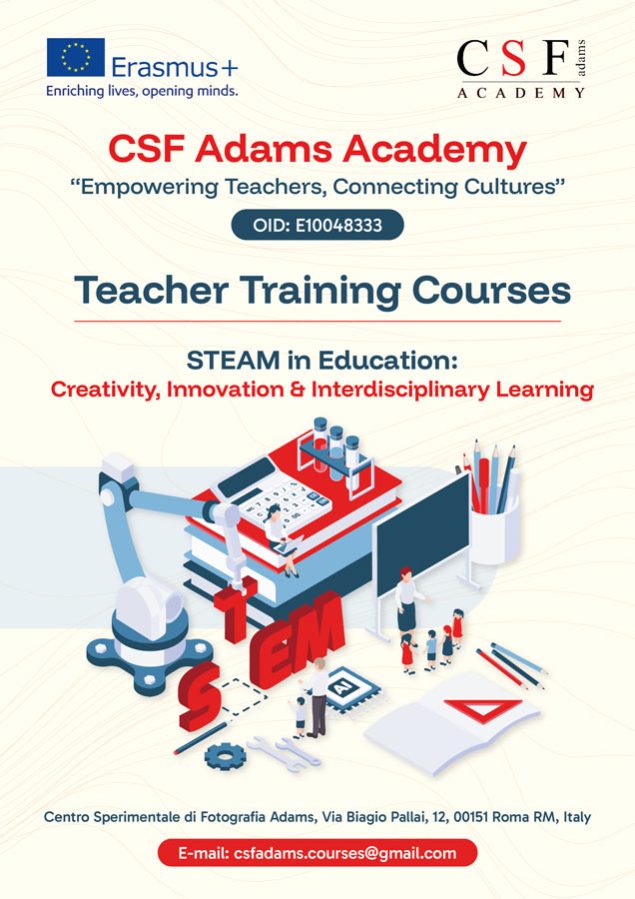
STEAM in Education: Creativity, Innovation & Interdisciplinary Learning
In a rapidly evolving world, education must nurture not only knowledge but also creativity, curiosity, and the ability to solve real-world problems. STEAM in Education: Creativity, Innovation & Interdisciplinary Learning empowers teachers to integrate Science, Technology, Engineering, Arts, and Mathematics in meaningful and dynamic ways. This course promotes hands-on, project-based learning that connects disciplines, encourages critical thinking, and fosters innovation. Through interactive experiences and collaborative exploration, participants will discover how to design inclusive, engaging, and future-ready learning environments that inspire all learners to think like creators, scientists, and problem-solvers.
- STEAM in Education: Creativity, Innovation & Interdisciplinary Learning is a future-focused training course designed to help teachers bring together science, technology, engineering, the arts, and mathematics in engaging and inclusive ways. The course emphasizes the value of interdisciplinary learning that mirrors real-life challenges, encouraging students to think critically, collaborate, and create solutions through hands-on experiences. Participants will explore how to design project-based activities, integrate digital tools, and apply creative teaching techniques that spark curiosity and deepen understanding across subjects. With a focus on innovation, sustainability, and inclusive participation, the course equips educators with practical strategies to make learning more relevant, meaningful, and empowering for 21st-century learners.
- To understand the core principles and educational value of STEAM (Science, Technology, Engineering, Arts, and Mathematics) integration.
- To develop skills in designing interdisciplinary, project-based learning experiences that promote creativity and innovation.
- To explore how arts-based approaches enhance problem-solving, critical thinking, and scientific inquiry.
- To use real-world challenges and collaborative activities to foster student engagement and curiosity.
- To incorporate digital tools and hands-on materials in designing inclusive STEAM lessons.
- To connect STEAM education with sustainability, global citizenship, and 21st-century skills.
- To create adaptable, learner-centered STEAM activities that encourage exploration, expression, and teamwork.
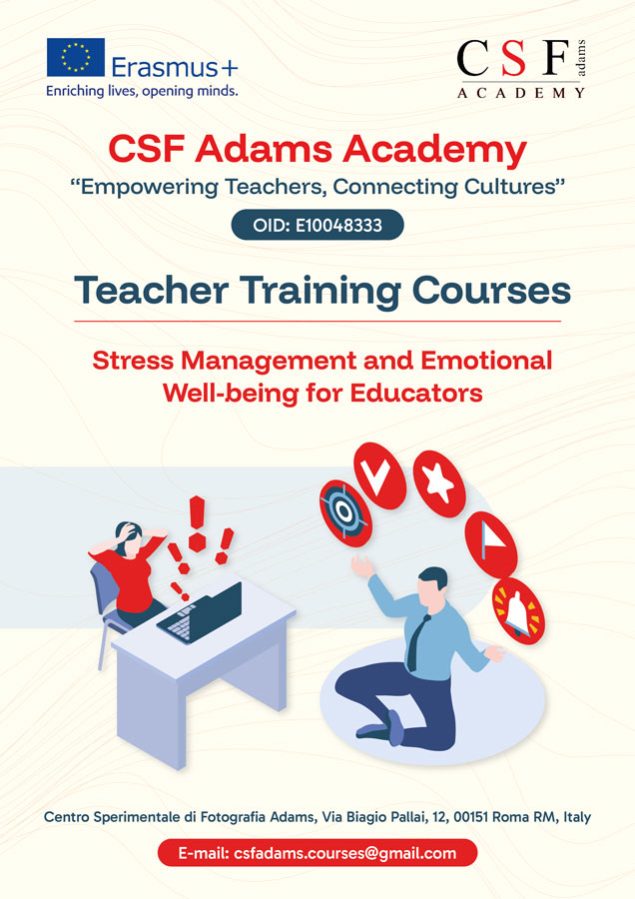
Stress Management and Emotional Well-being for Educators
Teaching is a rewarding yet demanding profession, often accompanied by high stress and emotional challenges. Stress Management and Emotional Well-being for Educators is designed to help teachers build resilience, manage stress, and maintain a healthy work-life balance. This course offers practical strategies for dealing with the pressures of the classroom while enhancing emotional well-being.
Stress Management and Emotional Well-being for Educators is a comprehensive training course aimed at supporting teachers in managing the unique stressors of their profession. The course covers the causes of stress in education, explores the impact of stress on physical and emotional health, and provides practical tools to prevent and reduce burnout. Participants will explore mindfulness techniques, time management strategies, and self-care practices that promote resilience and well-being. Additionally, the course addresses how emotional well-being influences classroom dynamics and student outcomes, emphasizing the importance of teacher self-awareness in fostering positive learning environments. By the end of the course, teachers will be equipped with personalized stress management plans and a deeper understanding of how to maintain emotional health while being an effective educator. Learning objectives of this course are:
- To identify common stressors in the teaching profession and understand their impact on emotional and physical well-being.
- To develop mindfulness and self-care practices that reduce stress and promote emotional balance.
- To create personal strategies for managing time, setting boundaries, and improving work-life balance.
- To build resilience and emotional intelligence to navigate stressful classroom situations.
- To recognize the connection between teacher well-being and student engagement and outcomes.
- To develop a personalized stress management plan for long-term emotional well-being and professional fulfillment.
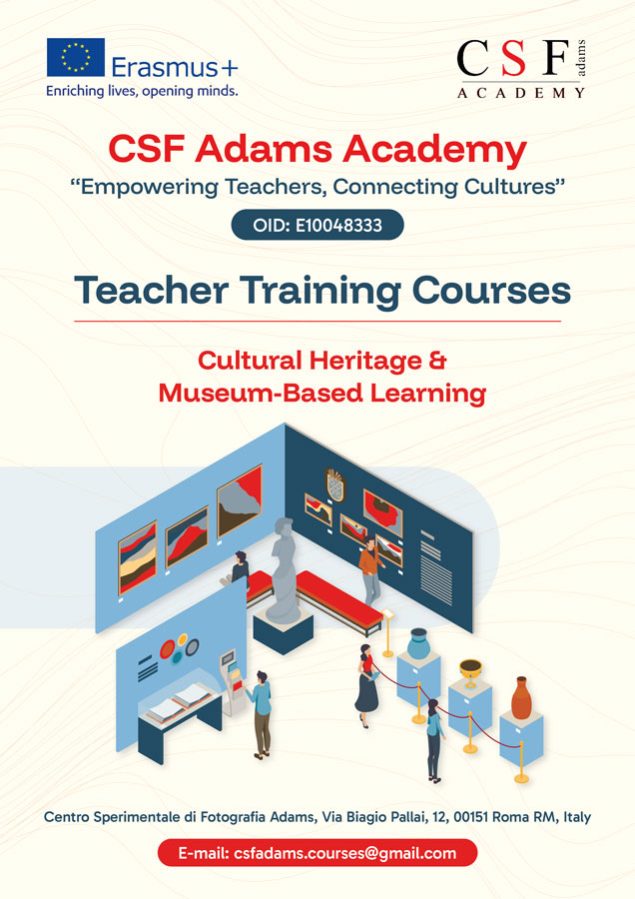
Cultural Heritage & Museum-Based Learning
Cultural heritage is an invaluable resource for education, fostering understanding, respect, and connection to the past, present, and future. Cultural Heritage & Museum-Based Learning is a course designed to empower educators with the tools to integrate cultural heritage into their teaching through engaging museum-based learning experiences. Participants will explore how museums, galleries, and heritage sites can serve as dynamic learning environments that bring history, art, and culture to life. The course emphasizes the importance of inclusivity, critical thinking, and creative interpretation in cultural education, enabling teachers to guide students through the rich stories and experiences embedded in cultural heritage.
Cultural Heritage & Museum-Based Learning is a comprehensive course designed for educators who seek to use cultural heritage sites and museums as powerful tools for engaging and dynamic learning experiences. The course explores how museums and galleries can serve as rich, interactive classrooms that deepen students’ understanding of history, culture, and art. Participants will learn how to design curriculum that integrates museum visits, virtual exhibitions, and hands-on activities that foster inquiry-based learning, critical thinking, and creativity. The course emphasizes inclusive approaches, ensuring that all learners, regardless of background or ability, can connect with and appreciate cultural heritage. By the end of the course, educators will have developed strategies for incorporating cultural heritage into their teaching, creating meaningful and immersive learning experiences that promote empathy, respect, and a deeper connection to the world around us. Learning objectives of this course are:
- To understand the role of museums and cultural heritage sites in education, fostering connection and understanding of diverse cultures and histories.
- To explore creative ways to incorporate cultural heritage and museum-based learning into the classroom curriculum.
- To develop strategies for using museums and galleries as interactive learning environments that promote critical thinking, inquiry, and exploration.
- To examine the principles of inclusive cultural education and adapt museum learning for students with different needs and backgrounds.
- To create immersive, hands-on museum-based activities that engage students in learning through art, history, and culture.
- To reflect on the role of cultural heritage in shaping identity, community, and global citizenship.
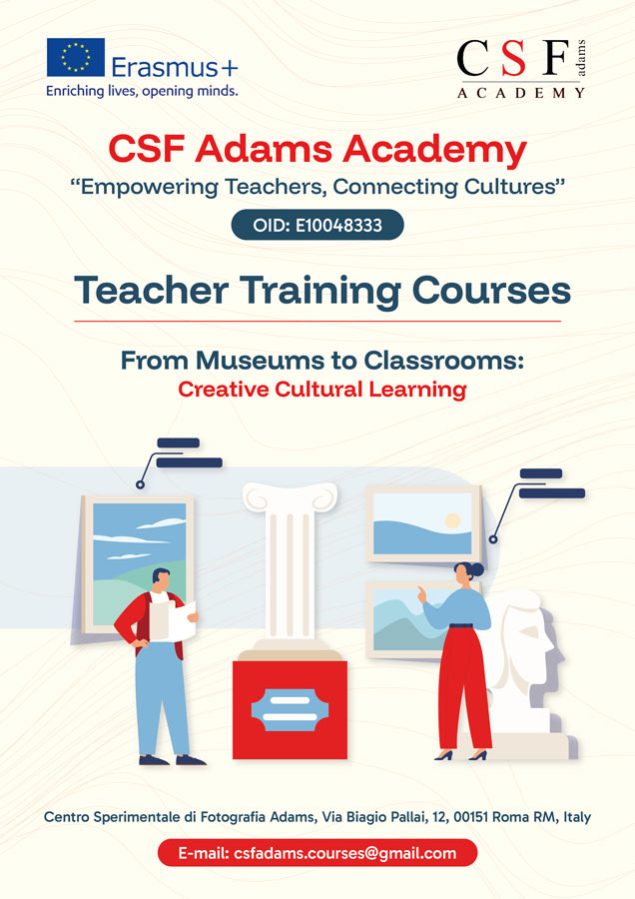
From Museums to Classrooms: Creative Cultural Learning
Museums are dynamic spaces for exploration and discovery, offering rich opportunities to connect with history, art, and culture in creative and meaningful ways. From Museums to Classrooms: Creative Cultural Learning is designed to help educators bring the world of museums into their teaching, transforming classroom learning through creative and immersive cultural experiences. This course equips educators with the tools to integrate museum-based activities, exhibits, and storytelling into their lessons, fostering critical thinking, cultural understanding, and creative expression. By using museums as a source of inspiration, teachers will learn how to design engaging, interdisciplinary lessons that bring cultural learning to life for all students.
From Museums to Classrooms: Creative Cultural Learning is a practical and innovative course that explores how museums and cultural institutions can enhance classroom education through creative, hands-on learning experiences. Participants will explore how to use museum exhibits, artifacts, and interactive resources to design lessons that inspire curiosity, build critical thinking skills, and promote cultural literacy. The course emphasizes interdisciplinary learning, combining history, art, science, and literature with museum resources to create dynamic educational experiences. Teachers will learn to adapt museum visits, virtual tours, and creative projects to engage students of all ages and abilities, while promoting inclusivity and cultural awareness. By the end of the course, educators will be equipped with creative methods for integrating museum-based learning into their classrooms, helping students connect with cultural heritage and history in meaningful ways.
Learning objectives of this course are:
- To understand the role of museums and cultural institutions in fostering creativity, critical thinking, and cultural awareness in the classroom.
- To develop skills for designing interdisciplinary lessons that integrate museum exhibits and artifacts into the curriculum.
- To explore creative ways to adapt museum resources for students of different ages, abilities, and backgrounds.
- To learn how to organize and facilitate museum visits, both physical and virtual, that enhance learning and engagement.
- To design hands-on, project-based activities inspired by museum collections, exhibitions, and cultural heritage.
- To foster a deeper understanding of cultural diversity and history through museum-based storytelling and exploration.
- To create an inclusive classroom environment where students can appreciate and engage with diverse cultural perspectives.
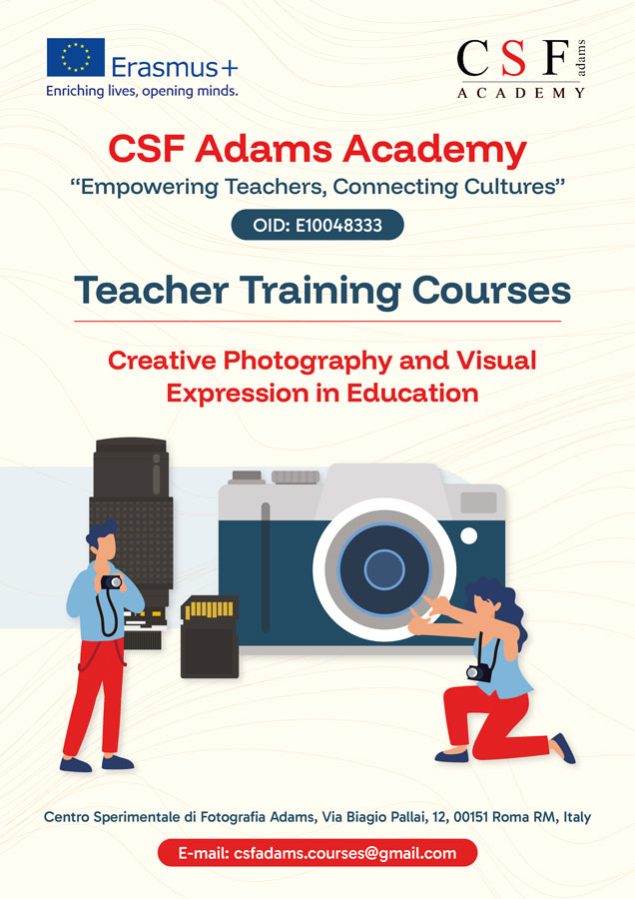
Creative Photography and Visual Expression in Education
Photography and visual expression have the power to transform how students engage with learning, enabling them to connect emotionally and intellectually with the world around them. Creative Photography and Visual Expression in Education is a course designed to help educators integrate photography and visual arts into their teaching, fostering creativity, critical thinking, and visual literacy. Participants will explore how to use photography as a tool for storytelling, self-expression, and engagement across all subjects. Through hands-on workshops, reflective practices, and project-based learning, this course will guide educators in harnessing the power of images to enrich their classrooms, making learning more interactive, inclusive, and visually dynamic.
Creative Photography and Visual Expression in Education equips educators with the skills and strategies to use photography as a means of creative expression and learning in the classroom. This course explores how photography can be used to teach a variety of subjects, including art, history, literature, and social sciences, by engaging students in visual storytelling and creative projects. Participants will learn how to encourage students to think critically about images, use photography as a form of self-expression, and design lessons that integrate visual literacy into everyday learning. Emphasizing hands-on photography techniques in owr own studio, the course will also explore digital tools and photo-editing apps to enhance students’ creative work. By the end of the course, educators will be able to integrate photography and visual expression into their teaching practice, fostering an inclusive, creative, and visually engaging learning environment.
Learning objectives of this course are:
- To understand the role of photography and visual expression in enhancing creativity, critical thinking, and learning in the classroom.
- To develop practical skills in using photography as a tool for teaching various subjects, including art, history, literature, and social studies.
- To explore techniques for using photography to tell stories, express ideas, and document learning experiences.
- To learn how to use digital tools and photo-editing software to enhance students’ creative work.
- To integrate visual literacy into lesson plans, encouraging students to analyze, interpret, and create with images.
- To create project-based learning opportunities that encourage students to express themselves visually and engage with course content in creative ways.
- To design inclusive lessons that support diverse learners through visual and photographic activities.

Entrepreneurial Mindset in Education: Fostering Creativity, Initiative & Innovation
An entrepreneurial mindset is not just for business – it’s a powerful tool for educators to foster creativity, initiative, and innovation in their classrooms. Entrepreneurial Mindset in Education: Fostering Creativity, Initiative & Innovation is a course designed to help educators develop and apply entrepreneurial thinking in their teaching practice.
Entrepreneurial Mindset in Education: Fostering Creativity, Initiative & Innovation is designed to help educators understand and implement an entrepreneurial approach to teaching and learning. This course explores key concepts such as creativity, innovation, problem-solving, and resilience, and shows how they can be integrated into various subjects and teaching methods. Participants will engage in interactive activities and case studies that demonstrate how entrepreneurial thinking can be used to foster a proactive, solution-oriented mindset in students. The course focuses on developing both educators’ and students’ entrepreneurial skills, empowering learners to take initiative, overcome challenges, and think outside the box. By the end of the course, teachers will be able to design and deliver lessons that promote creativity, initiative, and innovative thinking, helping students develop the skills they need for success in an ever-changing world.
Learning objectives of this course are:
- To understand the key principles of entrepreneurial thinking, including creativity, initiative, and innovation, and how they can be applied in educational settings.
- To develop strategies for fostering an entrepreneurial mindset in students, encouraging them to take initiative, solve problems, and embrace challenges.
- To explore how to integrate entrepreneurial thinking into a variety of subjects and teaching practices, making learning more engaging and impactful.
- To apply design thinking, project-based learning, and collaborative strategies to encourage creativity and innovation in the classroom.
- To understand the importance of fostering a growth mindset and resilience in students and how this can be supported in the classroom.
- To create classroom activities and projects that promote creativity, critical thinking, and innovation, equipping students with the skills for the future.
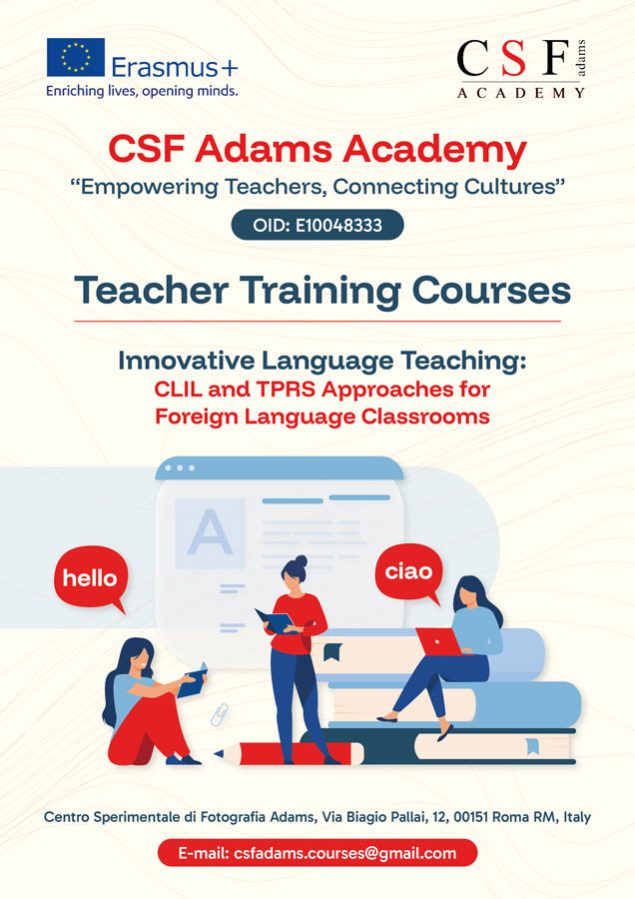
Innovative Language Teaching: CLIL and TPRS Approaches for Foreign Language Classrooms
Language teaching today demands creativity, adaptability, and an integrated approach to foster deeper learning and cultural understanding. Innovative Language Teaching: CLIL and TPRS Approaches for Foreign Language Classrooms is a course designed to introduce educators to two dynamic methods for language instruction: Content and Language Integrated Learning (CLIL) and Teaching Proficiency through Reading and Storytelling (TPRS). This course will empower teachers to combine language learning with content-based instruction and storytelling techniques, enhancing students’ linguistic abilities while engaging them in meaningful, real-world contexts. By the end of the course, educators will have the tools to create immersive, effective, and engaging foreign language lessons that motivate students to communicate confidently and meaningfully.
Innovative Language Teaching: CLIL and TPRS Approaches for Foreign Language Classrooms explores two powerful methods for language acquisition. CLIL integrates language learning with content learning, allowing students to use the target language to explore subjects such as science, history, and art. TPRS, on the other hand, focuses on acquiring language through stories, making the process natural and fun. In this course, educators will learn how to apply these approaches to create engaging, context-rich language lessons that promote higher levels of comprehension and retention. Through interactive workshops, case studies, and practical lesson planning, participants will gain a deeper understanding of how to adapt CLIL and TPRS strategies to their own classroom settings. By the end of the course, educators will be equipped to design and implement innovative foreign language teaching practices that are both effective and enjoyable for students.
Learning objectives of this course are:
- To understand the principles and benefits of Content and Language Integrated Learning (CLIL) and Teaching Proficiency through Reading and Storytelling (TPRS).
- To develop practical skills for incorporating CLIL into language instruction, combining content learning with language acquisition.
- To explore how TPRS techniques can be used to teach foreign languages through storytelling, making learning fun and interactive.
- To design lesson plans that integrate CLIL and TPRS methods, fostering an immersive and engaging language learning environment.
- To create strategies for assessing language skills in a CLIL and TPRS-based classroom.
- To integrate cultural content into language lessons, promoting cross-cultural understanding and communication.
- To use stories and real-world content to motivate students and enhance their language acquisition process.

